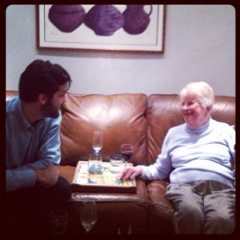Why Study Critical Thinking?
People often ask me why they should take a class in critical thinking. Their typical refrain is, “I already know how to think.” I find that the best answer is a story about the mistakes we often make.
So I offer up the following example, drawn from recent news, about very smart people who missed a critical clue because they were not thinking critically.
The story is about the conventional wisdom surrounding Alzheimer’s. We’ve known for years that people who have Alzheimer’s also have higher than normal deposits of beta amyloid plaques in their brains. These plaques build up over time and interfere with memory and cognitive processes.
The conventional wisdom holds that beta amyloid plaques are an aberration. The brain has essentially gone haywire and starts to attack itself. It’s a mistake. A key research question has been: how do we prevent this mistake from happening? It’s a difficult question to answer because we have no idea what triggered the mistake.
But recent research, led by Rudolph Tanzi and Robert Moir, considers the opposite question. What if the buildup of beta amyloid plaques is not a mistake? What if it serves some useful purpose? (Click here and here for background articles).
Pursuing this line of reasoning, Tanzi and Moir discovered the beta amyloid is actually an antimicrobial substance. It has a beneficial purpose: to attack bacteria and viruses and smother them. It’s not a mistake; it’s a defense mechanism.
Other Alzheimer’s researchers have described themselves as “gobsmacked” and “surprised” by the discovery. One said, “I never thought about it as a possibility.”
A student of critical thinking might ask, Why didn’t they think about this sooner? A key tenet of critical thinking is that one should always ask the opposite question. If conventional wisdom holds that X is true, a critical thinker would automatically ask, Is it possible that the opposite of X is true in some way?
Asking the opposite question is a simple way to identify, clarify, and check our assumptions. When the conventional wisdom is correct, it leads to a dead end. But, occasionally, asking the opposite question can lead to a Nobel Prize. Consider the case of Barry Marshall.
A doctor in Perth, Australia, Marshall was concerned about his patients’ stomach ulcers. Conventional wisdom held that bacteria couldn’t possibly live in the gastric juices of the human gut. So bacteria couldn’t possibly cause ulcers. More likely, stress and anxiety were the culprits. But Marshall asked the opposite question and discovered the bacteria now known a H. Pylori. Stress doesn’t cause ulcer, bacteria do. For asking the opposite question — and answering it — Marshall won the Nobel Prize in Medicine in 2005.
The discipline of critical thinking gives us a structure and method – almost a checklist – for how to think through complex problems. We should always ask the opposite question. We should be aware of common fallacies and cognitive biases. We should understand the basics of logic and argumentation. We should ask simple, blunt questions. We should check our egos at the door. If we do all this – and more – we tilt the odds in our favor. We prepare our minds systematically and open them to new possibilities – perhaps even the possibility of curing Alzheimer’s. That’s a good reason to study critical thinking.
Good News on Dementia?

Harriet speaks to the future.
My mother-in-law, Harriet, is a delightful nonagenarian who is still as sharp as a tack. What’s the secret to her mental acuity? I’m willing to bet that the fact that she’s an avid bridge player has something to do with it.
Indeed, Harriet may be a leading indicator of the changing shape of the dementia demographic. Conventional wisdom holds that our health care system is about to be overwhelmed as the baby boom ages and sinks into dementia.
The logic is straightforward. Major premise: Old age is the leading risk factor for dementia. Minor premise: People are living longer. Conclusion: Everybody will become demented sooner or later and our health care system will collapse.
In the current issue of New Scientist, however, Liam Drew reports on new research that suggests that Harriet may be an emblem of change, not an exception to it. As Drew points out, the conventional wisdom “… is based on the assumption that people will continue to develop dementia at the same rate as they always have.” Drew then reports on two studies that suggest this assumption is no longer true (if it ever was).
The first is a research report from the Lancet that compares two dementia censuses conducted 20 years apart in three regions the U.K. The first census, conducted in 1994, counted 650,000 people with dementia. In 2013, the researchers repeated the study and, assuming that the dementia rate held steady, projected that they would find 900,000 people with dementia. Instead, they found about 700,000. The report concludes that, “Later-born populations have a lower risk of prevalent dementia than those born earlier in the past century.”
The second study, conducted in Denmark, reached essentially the same conclusion. The research compared people born in 1905 with those born in 1915. Drew reports that, “While the two groups had similar physical health, those born in 1915 markedly outperformed the earlier-born in cognitive tests.”
So, what’s going on? Well, for one thing, we’re taking better care of our hearts. In general, healthier hearts provide better circulation. More oxygen-rich blood reaches our brains, which probably improves brain health. A heart healthy lifestyle may also be a brain healthy lifestyle.
Another theory is cognitive reserve, which suggests that we may be able to make our brains more resilient and resistant to damage. In other words, the brain is not just a “given”; it can be developed in much the same way that a muscle can. As Wikipedia puts it, “Exposure to an enriched environment, defined as a combination of more opportunities for physical activity, learning and social interaction, may produce structural and functional changes in the brain and influence the rate of neurogenesis … many of these changes can be affected merely by introducing a physical exercise regimen rather than requiring cognitive activity per se.”
What creates cognitive reserve? Educational attainment seems to play an important role. Physical and social activity also seem to contribute. I can’t help but wonder whether playing bridge – which combines social and cognitive elements – might not be the perfect way to build our cognitive reserves.
Over the years, we’ve all learned a lot from Harriet. She’s smart and she’s wise. And she may just have taught us how to live intellectually rich lives for many years to come. Thank you, Harriet.
